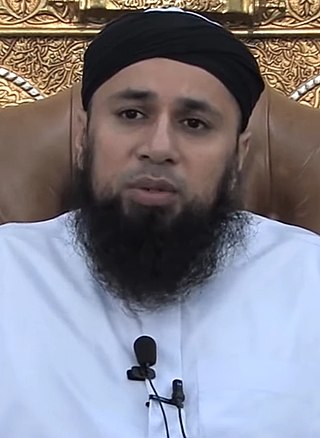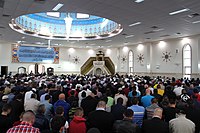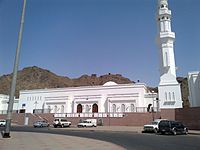
Mustafa Kamel Mustafa, also known as Abu Hamza al-Masri, or simply Abu Hamza, is an Egyptian cleric who was the imam of Finsbury Park Mosque in London, England, where he preached Islamic fundamentalist views.
Abu Hamza meaning father of Hamza, is a given name and a common alias used by several people, it may refer to:

Jamaat Ansar al-Sunnah, also known as Jaish Ansar al-Sunna, Ali ibn Abi Talib Battalion or simply as Ansar al-Sunnah was an Iraqi Sunni insurgent group that fought against US troops and their local allies during the Iraq War. The group was primarily based in northern and central Iraq, and included mostly Iraqi fighters. In 2007, it split; with its Kurdish members pledging allegiance to Ansar al-Islam, and its Arab members creating a group called Ansar al-Sunnah Shariah Committee, before changing its name to Ansar al-Ahlu Sunnah in 2011.
Omar Bakri Muhammad is a Syrian Islamist militant leader born in Aleppo. He was instrumental in developing Hizb ut-Tahrir in the United Kingdom before leaving the group and heading to another Islamist organisation, Al-Muhajiroun, until its disbandment in 2004.

Anjem Choudary is a Pakistani-British Islamist and a social and political activist who has been described as "the face" of militant Islamism or the "best known" Islamic extremist in Britain.

Islam in Australia is a minority religious affiliation. According to the 2021 Census in Australia, the combined number of people who self-identified as Muslims in Australia, from all forms of Islam, constituted 813,392 people, or 3.2% of the total Australian population. That total Muslim population makes Islam, in all its denominations and sects, the second largest religious grouping in Australia, after all denominations of Christianity.
The Saved Sect, formerly and more generally known as The Saviour Sect, is an Islamist organization that operated in the United Kingdom from its formation in November 2005 until the British government proscribed it on 17 July 2006. It is widely believed, along with Al Ghurabaa, to be the reformed Al-Muhajiroun which Omar Bakri Muhammad disbanded in 2004. It is believed that Omar Bakri today still heads this organisation.
Al Ghurabaa is a Muslim organization based in United Kingdom which, along with The Saviour Sect, Islam4UK and others, is widely believed to be the reformed Al-Muhajiroun after it disbanded in 2004 by order of Omar Bakri Muhammad. Other members include Abu Izzadeen and Abu Uzair.
Abdul Nacer Benbrika, also known as Abu Bakr, is a convicted criminal, currently serving an Australian custodial sentence of fifteen years, with a non-parole period of twelve years for intentionally being the leader and a member of a terrorist organisation. Benbrika was one of 17 men arrested in the Australian cities of Sydney and Melbourne in November 2005, charged with being members of a terrorist organisation and of planning terrorist attacks on targets within Australia. Benbrika is alleged to be the spiritual leader of the group. All 17 men pleaded not guilty. On 15 September 2008 Benbrika was found guilty as charged and subsequently sentenced.
Sulayman Keeler is a Muslim convert and leader of Ahlus Sunnah wal Jamaah, a British Islamist organisation. He is a former member of Al-Muhajiroun, a banned organisation designated as a terrorist organisation, and led the Society of Converts to Islam.
Abdul Rahman Saleem, also known as Abu Yahya, is a British Islamic activist, born around 1975.

Feiz Mohammad is an Australian Muslim preacher.

Riyadh ul Haq is a British Islamic scholar. He has been lecturing and teaching as the lead scholar at Al Kawthar Academy, Leicester since 2004.

Khalid Kelly, born Terence Edward Kelly, also known as Abu Osama Al-Irlandi and Taliban Terry was an Irish Muslim convert and at one time the leader of Al-Muhajiroun in Ireland.

A series of battles in Hiraan, Shabeellaha Dhexe and Galgudug, between rebels of al-Shabaab and Hizbul Islam and Somali government forces and ICU militants loyal to the government, erupted during spring 2009. The fighting led to al-Shabaab capturing major government strongholds and Ethiopian forces re-entering Somalia and setting up bases in Hiraan. There was a halt in fighting during a government offensive in Mogadishu, which started on May 22.
Jamaat Ahle Sunnat is a Muslim religious organization in Pakistan that represents the Barelvi movement. It was supported by Muhammad Shafee Okarvi. As a Sunni organisation it has adopted many Sufi customs and traditions.
Islamic organisations in Australia include a wide range of groups and associations run and supported by the Islamic community in Australia. Organisations include major community councils, local organisations, mosques and schools. Most Australian Muslims are Sunni, with Shia then Sufi and Ahmadiyya as minorities.

The Ahlus Sunnah Wal Jamaah Association of Australia (ASWJA) was founded by Melbourne sheikh Mohammed Omran. Ahlus Sunnah Wal Jamaah is a generic term referring to Sunni Islam. Those who adopt it as organisational name do so as adherents of the Salafi movement in Australia, US, UK, and Canada.
Muzaffar Shah Qadri is a Pakistani Barelvi Sunni Islamic scholar and the son of sufi saint Nobat Ali Shah Qadri. He is a Friday preacher at the Jama Masjid Habibiya, the Chairman of the Jazba Welfare Trust, and a leader of the Ahlus Sunnah Wal Jamaah.
Alkhairaat is the largest Islamic community organization in eastern Indonesia based in Palu, Central Sulawesi. This organization was founded by an Arab Indonesians cleric who born in Hadhramaut named Habib Sayyid Idrus bin Salim al-Jufri on June 30, 1930.









